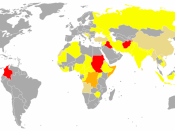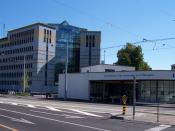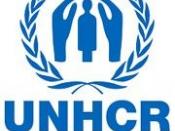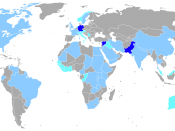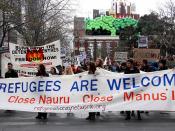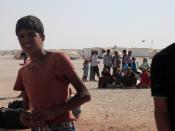Refugees are people who have escaped from their countries because of a legitimate fear of persecution, torture or death due to their race, religion, nationality, politics, ethnicity or participation in a social group (UNHCR, 2001). A refugee is unable to return home because of this well-founded fear. Often refugees are separated from their families and detached from their communities: this makes them vulnerable to violence and mistreatment. Most refugees seek protection in nearby countries; in some circumstances, refugee camps are established and refugees are forced to live in there until the problems in their homeland is resolved (UNHCR, 2001). However, some refugees are compelled to find asylum in countries thousands of miles away from their homeland. This proves to be more challenging for these people as the language and culture is very different from their own. Refugees often feel isolated, abandoned, and terribly lonely.
Refugees act as the living reminder of societies failure to exist in peace (UNHCR, 2001).
All people should be allowed to lead liberated lives in their homeland. Abuse, violation of rights, or social disruptions such as war force people to run for safety. One in every 50 people is a refugee, a migrant, an asylum seeker or a displaced person (Fernandez, 1999).
Refugees are the evidence of the evils of a particular age: war, intolerance, and persecution. In the early 1990s, many sociologists and politicians predicted a reduction in the number of refugees worldwide (UNHCR, 2001). Sadly, the recent troubles in Eastern Europe and the continued problems in Africa have generated thousands of refugees.
Despite their desperation and vulnerability, refugees are entitled to the fundamental rights of every individual including freedom of thought and movement, and freedom from torture and degradation. Refugees have the right to seek asylum, to freedom from forcible return, and the right to receive economic assistance (PDHRE, 2001). Plus, they are also entitled to preserve their social and cultural traditions. In return, refugees must respect the laws of their country of asylum.
When refugees arrive in a foreign country seeking safety and protection, they receive assistance from the country of asylum. The office of the United Nations High Commissioner for Refugees was established in 1951; the UNHCR currently cares for 12 million refugees, mostly from Africa and Asia (UNHCR, 2001). The violation of human rights is presently one of the main causes of mass emigration.
No one wants to be a refugee, living apart from family and community and depending on strangers for food and shelter. While most people can depend on their government to protect their basic rights, refugees have been abandoned by their homeland (UNHCR, 2001). Those people working with refugees seek one of three solutions for their clients. The preferred solution is called voluntary repatriation: when the conditions in their homeland have changed to the extent that these refugees are no longer at risk of harm, the refugee agencies help organize their return. The end of a civil war can lead to this solution (Fernandez, 1999). The second solution is the local integration of refugees into the country of asylum (Fernandez, 1999). When the economy is good, host countries welcome refugees; however, when politics and finances languish, these countries are less welcoming to strangers as leaders feel they must look after problems in their own countries and with their own citizens before helping foreigners. The last solution is resettlement in third countries, which is only available to 1% of the 13.5 million refugees in the world today (Fernandez, 1999). The countries of resettlement have begun decreasing the number of refugees they will receive due to economic strain and societal pressure. Sadly, no country wants refugees anymore: poor countries feel barely able to care for their own citizens adequately while rich countries are afraid of being overwhelmed by strangers and their problems (Fernandez, 1999).
Apart from the government agencies that assist refugees, many privately run groups help refugees settle into their new country. The United Methodist Church sponsors more than 60 refugees projects around the world. They offer funding to refugees and help them return home if possible. The Council of Bishops of The United Methodist Church states that ï¼ÂWe pledge ourselves to know them [refugees], their circumstances and needs; to love them, to embrace them and their struggle; to bid them welcome to our communities.ï¼ (Fernandez, 1999). The church also solicits the government to continue welcoming refugees, and establishes volunteer legal services to refugees.
The Amnesty International Refugee Network works to prevent the return of any person to a country where he or she would be at risk of imprisonment, torture or death (Amnesty, 2000). Committed caseworkers provide help to those refugees requiring assistance.
People coming from other parts of the world and settling here founded Canada. There are millions of citizens today who are descendents of refugees who escaped persecution from one country and found safety and a new life in Canada. Since the end of the Second World War, Canada has become an asylum for more than half a million people of all nationalities. Because Canada is an active participant in the United Nations Convention for Refugees, Canada must offer protection to refugees and help them resettle (Labossiere, 2001).
The Canadian refugee determination system is a detailed and complex process. Each refugee must complete a Personal Information Form that reveals facts about his or her family background, education, work experience, and method of entry into Canada (Labossiere, 2001). The refugee must also explain the reason why the fear of persecution exists in their home country. Many obtain legal assistance for this purpose. After this form has been completed, a Senior Immigration Officer determines if the individual is eligible to have his claim heard by the Immigration and Refugee Board, which usually consists of two people. A Refugee Claims Officer provides additional information about the individualã»s case and assists in the procedure. If the IRB grants the individual refugee status, the refugee is able to apply for permanent resident status in Canada. If the IRB does not grant the individual refugee status, then the individual will be given 30 days to leave Canada. The claimant is told the reasons why his claim is unsuccessful. This individual may ask for his case to be reviewed by other Immigration Officers, or he may apply for a judicial review by the Trial Division of the Federal Court (Amnesty, 2000).
Canadian Federal and Provincial governments offer many services for refugees. Successful claimants are entitled to financial support if they are unable to find jobs and health care is provided for them. Refugees struggle when dealing with government agencies as often the employees are overworked and do not speak the refugeeã»s language.
There have been changes to the Immigration Act of Canada in recent years. The influx of immigrants to our country has been restricted and there are now researchers who check for criminal backgrounds of refugee claimants and their connection with foreign governments (Labossiere, 2001). Immigration Officers can declare a claimant ineligible for refugee status if he has a criminal record, is a threat to national security or is already a refugee in another country (USCR, 2000). It is also more difficult for refugees to become landed immigrants. New Legislation has increased the penalties for migrant smuggling and trafficking, as well as increased ï¼Âthe number of immigrant officer aboard to direct genuine refugees to appropriate missions or international organization while preventing undocumented person from seeking irregular channels of migration to Canada.ï¼ (USCR, 2000).
In 2000, Canada resettled 10,236 refugees. 2,236 individual were from Afghanistan, 1,158 were from Iraq, 971 were from Sudan, and 948 were from the former Yugoslavia (Labossiere, 2001). Of the total refugees, 2,972 were granted refugee status under Canadaã»s source country and asylum country classes. Source country classification is for people who have been deprived of their civil rights and affected by civil war. In 2000, most refugees in this category came from Croatia, Bosnia and Columbia. Asylum country classification encompasses people who do not fit the traditional definition of a refugee according to UN standards but are still at risk for human rights violations and civil war. The refugees in this classification must be able to support themselves financially (USCR, 2000).
Last year, 310 of the 600 Chinese asylum seekers that arrived in BC on boats in 1999 were deported. By the end of 2000, Canada had granted refugee status to only 24 people and denied the rest (USCR, 2000). 151 asylum seekers disappeared and warrants for their arrest were issued. Also last year, over a thousand Hungarian asylum seekers, most of whom were Gypsies, arrived in Canada; some had been previously denied refugee status here. Only 29% of them were given refugee status, which was a noticeable decrease from 1998ã»s 71% approval rate (USCR, 2000).
Canadaã»s immigration laws are constantly changing but Canadaã»s commitment to helping refugees remains strong. Canada has consistently been classified by the United Nations as the best country in the world to live in. As a result, there are numerous people hoping to make Canada their home. Canada strives to help as many people as possible. Sadly, there are numerous individuals who are desperate to flee their home countries and begin new lives in a democratic, peaceful land. Canadaã»s immigration process is designed to fairly assist needy people who follow designated procedures. Canada is a multi-cultural country that thrives as a result of its citizensã» differences.
References Amnesty International, Canadian Section (E.S.),Pacific Region. (2000). Retrieved July 14,2001 from the World Wide Web: http://www.amnesty.bc.ca/index.html Fernandez, Lilia. (September-October, 1999). The Rights of Refugees: One in Every 50 People Is Uprooted! New World Outlook: The Mission Magazine of The United Methodist Church. Retrieved July 14, 2001 from the World Wide Web: http://gbgmumc.org/nwo/99so/refugees.html Human Rights Education Associated (HREA). (2001). Minority Rights. Retrieved July 14,2001 from the World Wide Web: http://erc.hrea.org/Library/index.html Labossiere, Robert. (Ed.). (February 2001). Refugees to Canada: Information about seeking Asylum in Canada. Retrieved July 14, 2001 from the World Wide Web: http://www.interlog.com/~driftr/canada.html#1 The Peopleã»s Decades of Human Rights Education (PDHRE). (2001). The Human Rights of Refugees: The Peopleã»s Movement for Human Rights Education. Retrieved July 14, 2001 from the World Wide Web: http://www.pdhre.org/pdhre/rights/refugees.html United Nations High Commissioners for Refugees (UNHCR). (1996-2001). For Teachers. Retrieved July 14, 2001 from the World Wide Web: http://www.unhcr.ch/teach/teach.htm U. S. Committee fro Refugees (USCR). (2000). (World Wide Refugee Information. Retrieved July 14, 2001 from the World Wide Web: http://www.refugees.org/world/worldmain.htm
